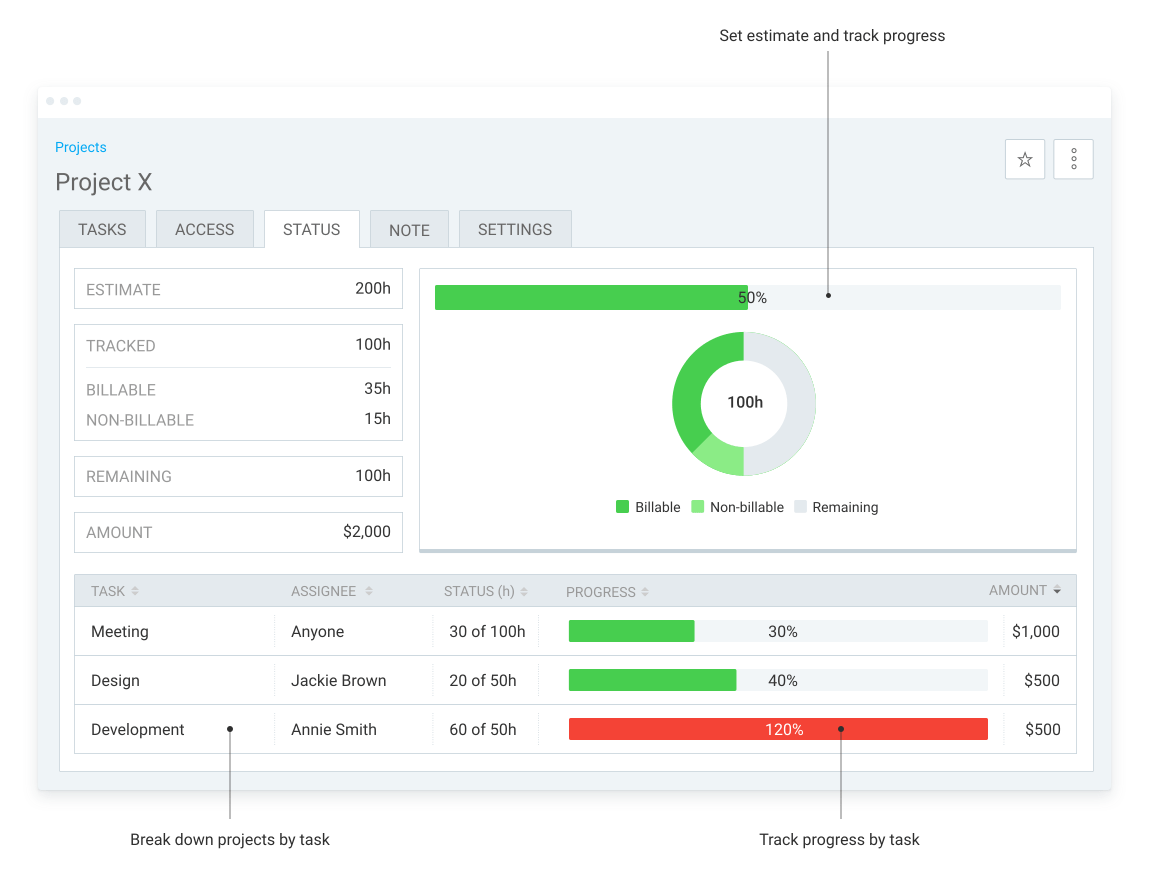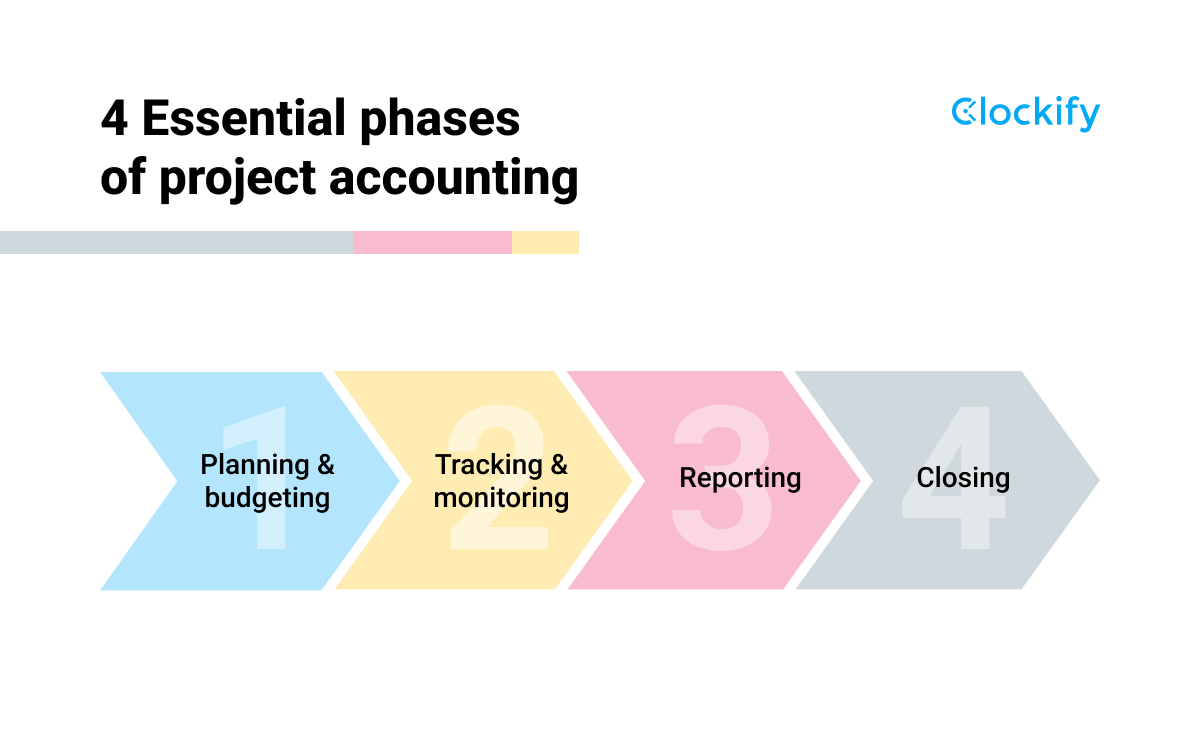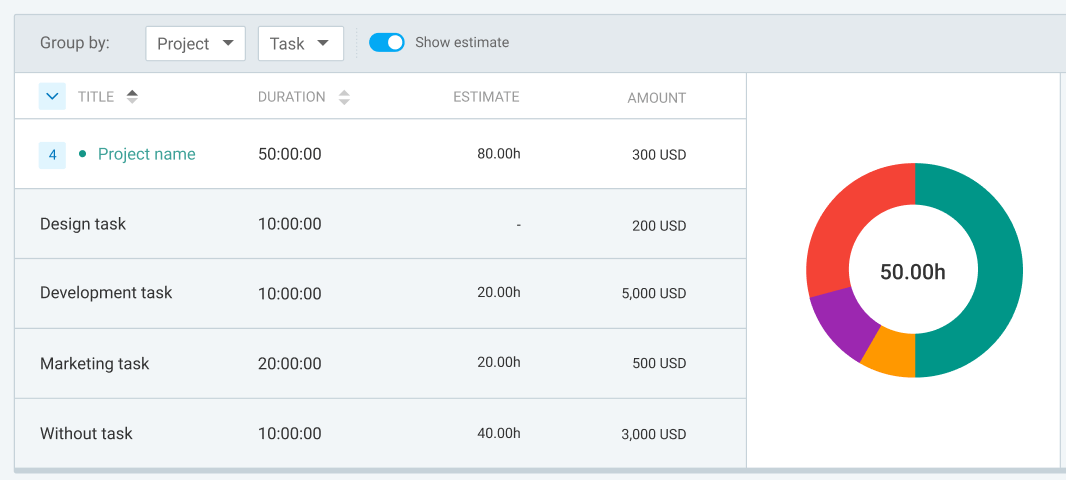Project accounting is an extremely valuable aspect of project management. It helps business owners and project managers:
- Plan,
- Control, and
- Evaluate the financial aspects of every project.
Tracking finances is crucial for the success of any project, which is why learning more about project accounting is a must!
In this blog post, we’re going over project accounting info every project manager should know, including:
- What is project accounting,
- What are its benefits,
- Project accounting phases,
- Tips on successful project accounting, and
- How to find good project accounting software.

Table of Contents
What is project accounting?
Project accounting is a process that involves keeping track of the finances of a project and using that information to manage that project effectively. Simply put, it’s a special form of accounting that is used to track the financial progress of a certain project.
Even shorter projects have multiple phases and could be pretty complex. Thus, it can be difficult to keep track of all the changes and expenses associated with them. Luckily, project accounting is there to keep things much more organized.
Project accounting records every cost associated with a specific project. These costs include:
- Materials,
- Labor, and
- All of the other expenses that can come of it.
The information collected from accounting is then used to ensure that the project stays on budget.
What’s more, project accounting is extremely valuable when it comes to estimating expenses for future projects. It allows business owners and project managers to easily generate reports and make predictions as well as keep relevant stakeholders informed.
Project accounting generally consists of:
- Creating an accounting system for a project,
- Specifying key performance indicators (KPIs),
- Keeping track of each transaction,
- Managing information on resources, from available materials and equipment to time spent,
- Updating cost information regularly, and
- Forecasting based on the received information.
Who uses project accounting?
Anyone with the insight into finances of a project can benefit from project accounting. The most frequent users of project accounting are:
- Project managers,
- Accountants, and
- Business owners.
The system can be useful in any type of project where costs and revenue, budget, and milestones have to be tracked. That is why the industries in which project accounting is essential are:
- Construction,
- Engineering,
- Manufacturing,
- IT, and
- Consulting.
What is an example of project accounting in the IT industry?
Project accounting can be used for any project you can think of in the IT industry.
Let’s say that a certain IT company is using project accounting for a software development project for a new app.
The manager of this project would use project accounting to:
- Track the project budget,
- Monitor costs and revenue,
- Log the expenses of hiring developers,
- Purchase software licenses,
- Rent office space, as well as
- Monitor income from the sale of the finished app.
To make this process easier, a project manager or an accountant can use a project time tracker, to create a list of the tasks necessary for completing the project. Then, they could associate the costs with each task, as that will give them a clear financial picture of the full project.

Having a clear picture of the finances helps project managers ensure that the project stays within budget.
In addition, accounting would allow them to determine whether project managers should make any financial adjustments to the plan, to keep the project on track. That could involve finding ways to increase revenue to offset any overages in the budget or negotiating for the reduction of development costs.
💡 Clockify Pro Tip
Not certain how to break your project down into tasks? Read this post to learn more:
Differentiating between common types of accounting
If you’re just now getting familiar with the term “project accounting”, you may start confusing it with other similar terms. Let’s break down the most popular types of accounting and how different they are from project accounting.
Project accounting vs. regular accounting
Project accounting is a specialized form of regular accounting.
Regular accounting relates to the overall financial matters of a business. It typically involves tracking the income and expenses of the business as a whole. In contrast, project accounting is focused on the financial aspects of a specific project, and involves tracking the costs and revenues associated with that project.
Another key difference between project accounting and regular accounting is the level of detail. Project accounting often involves tracking costs at a very granular level, such as tracking the cost of individual materials or labor hours.
Regular accounting, on the other hand, typically involves tracking expenses and revenues at a higher level, which includes the overall cost of a department or business unit.
| Project accounting | Regular accounting |
|---|---|
| Focused on a specific project | Focused on the business as a whole |
| Tracks costs at a granular level | Tracks overall costs at a higher level (department or unit) |
Project accounting vs. management accounting
The main difference between project accounting and management accounting is the focus of the two disciplines.
Project accounting is focused on the financial aspects of a specific project, and involves tracking the costs and revenues associated with that project.
On the contrary, management accounting is focused on providing information that managers can use to make informed decisions about the operations of a business. It typically involves analyzing financial data at a higher level, such as tracking the overall performance of a business unit or department.
| Project accounting | Management accounting |
|---|---|
| Focused on a specific project | Focused on the business or a department as a whole |
| Used by project managers | Used by business managers and owners |
Project accounting vs. cost accounting
Cost accounting is a type of accounting that determines the cost associated with a service or the manufacturing process of a product by examining every expense in the supply chain. So, it’s not connected to a specific project, but it can be.
Based on this definition, we can deduce that project accounting is a form of cost accounting. Thus, you can look at cost accounting as a broader term that involves expenses outside the scope of project accounting.
| Project accounting | Cost accounting |
|---|---|
| Focused on a specific project | Can be focused on any process in the operation of a business |
Key benefits of project accounting
Project accounting is a valuable tool that can help project managers and business owners manage their projects more effectively and make better decisions. Here are the main reasons why you should use project accounting for your next project.
Benefit #1: Project accounting allows you to control project costs
Accounting and project management go hand in hand! While working on a project, you can use project accounting to get accurate and up-to-date information about the financial status of your ongoing project.
Furthermore, you can use project accounting to examine the progress of a project at every phase. Project managers can use the resulting information to identify potential cost savings and make adjustments to the project budget on the go.
Moreover, the possibility of delays and what that means to the final expenditure on a project is easier to understand and manage with thorough project accounting.
Benefit #2: Project accounting informs you about potential expenses and helps you prepare for future projects
Project accounting provides project managers with the financial information they need in order to make informed decisions about their projects. Then, project managers can evaluate the feasibility of different project options and determine the best course of action.
What’s more, the benefits of project accounting don’t end when the project is complete. Forecasting is an essential aspect of every business and it’s important for predicting future expenses as well as the length of similar projects in the future. With project accounting, financial data from one project can be used for reference for similar projects in the future.
Benefit #3: Project accounting helps you create detailed project reports
With a clear financial picture of a project, project managers can easily create reports and update their stakeholders on its progress.
Additionally, project accounting data contains crucial information that has to be included in the final project report for:
- Investors,
- Management, and
- Stakeholders.
Project accounting makes creating final project reports so much easier, as all the data is already logged and tracked!
4 Essential phases of project accounting
The number of phases the project accounting process will go through depends on the project manager or the accounting department. Still, there are four phases in project accounting that are essential for a thorough financial overview of a specific project:
- Planning and budgeting,
- Tracking and monitoring,
- Reporting, and
- Closing.
We’ll explain each phase in detail in the following lines.

Phase #1: Planning and budgeting
The planning and budgeting phase starts before the project begins. This phase presents a crucial step for successful project accounting because it anticipates potential costs and sets milestones which have to be fulfilled.
The planning and budgeting phase consists of estimating every cost a project will endure, including:
- Labor,
- Hours,
- Equipment,
- Transportation,
- Materials, and
- Overhead.
Furthermore, project managers come up with a schedule for a project and outline every task that has to be completed in order for the project to be successful.
💡 Clockify Pro Tip
Billable hours present a major part of your project’s finances. You can easily track your billable hours using time and billing software:
Phase #2: Tracking and monitoring
Once the project begins, the project’s progress and budget have to be monitored closely.
In this phase, having project accounting software or hiring a project accountant is crucial for the project’s success. That’s because project accounting involves regularly comparing the actual revenues and costs to the estimated budget. By regularly monitoring the cost situation, project managers can make adjustments or ask for an increase in the budget without delays.
Good project management software, such as Clockify, allows you to easily monitor the project’s progress. You can log in all of the tasks, their duration, as well as all of the costs associated with them.

Then, you can also compare tracked time and estimated time for projects and tasks.
For example, in the screenshot above, we can see that the estimated time for the development task was longer than tracked time.
Phase #3: Reporting
Project accounting makes creating project reports much easier, as they follow every minor and major expense a project has to go through. Project managers can use the data collected from project accounting to create reports and present them to stakeholders and investors.
A great aspect of project accounting is that it is carried out while the project is ongoing. Thus, project managers can regularly update all the stakeholders involved and provide reports during every project stage.
Phase #4: Closing
In this final phase, project managers complete the project’s financial records and close out any outstanding accounts.
This may involve reconciling the project’s financial records with the organization’s main accounting system or completing any necessary tax or compliance forms. Once the project is closed, the project accounting records can be archived for future reference.
4 Key tips for successful project accounting
Having a project accountant or investing in accounting software won’t do much for you unless you ensure that you’ve covered all of the basics for successful project tracking. Here are some tips that will help you make the most of the project accounting skills or tools you have available!
Tip #1: Set the budget for the project
According to research, nearly 30% of organizations state poor resource management as a huge challenge for the success of their projects. Resource management refers to using available resources, such as time, equipment, people, and funds, in the most effective manner. Project managers should always establish a budget that outlines what can be done with the resources in possession.
By outlining your expected costs and revenues from the outset, you’ll have a clear benchmark against which you can measure your actual expenses and income as the project progresses. That way, you’ll easily be able to track any changes in costs as well as monitor the progress of a project using project accounting.
Moreover, you’ll be better equipped to handle unexpected expenses and changes to your project plan.
You could start by making a list of all the expected expenses, such as:
- Materials,
- Labor, and
- Overhead costs.
Don’t forget to include some wiggle room to account for the unexpected. Once you have a complete picture of your projected costs and revenues, you’ll be able to utilize project accounting to the fullest extent.
💡 Clockify Pro Tip
If you aren’t sure how to monitor the allocation of the available resources, here are some tips that can help you:
Tip #2: Carefully track costs
Don’t forget to keep a close eye on your actual costs and revenues as you go. By tracking these metrics accurately, you’ll be able to identify potential issues or areas for improvement and make adjustments to your project as needed.
By tracking project costs, you’ll also be more likely to stay within the budget. What’s more, you can catch any overspending before it becomes a major issue.
You should always keep detailed records of all your expenses and income, as well as the employee hours. These expenses could include receipts, invoices, and other documents that show how much you’re spending and earning. Be sure to update your records regularly, and compare them to your original budget to see how you’re doing.
💡 Clockify Pro Tip
Cost management is a crucial aspect of project accounting. Learn more about direct and indirect project costs here:
Tip #3: Create financial reports regularly
Having regular financial reports is essential for all project managers. Reports contain detailed information about the financial status of your project. They’ll help you communicate with stakeholders, such as investors or executive management.
The first step to creating a good financial report is to gather all the relevant financial data, such as receipts, invoices, and other documents that show how much you’re spending and earning. Then, you should organize this data into a clear and concise report that presents the most important information in an easy-to-understand format.
A successful project accounting report should include:
- A summary,
- Key performance indicators,
- Graphs and charts for easier understanding,
- Interpretation of data,
- Goals achieved, and
- Projections.
Furthermore, by having all the relevant info on the project’s finances in one place, you’ll easily be able to see if you’re on track to meet your financial goals. You’ll also see how your expenses and income are actually panning out. So, you’ll be better equipped to identify areas where you can save time, money, or resources. That can help you to streamline your project and make it more efficient overall.
Tip #4: Identify potential issues and correct them
Project accounting allows you to have a clear picture of the full scope of your project’s financial matters. But, it won’t do much for you if you’re not ready to review the finances regularly and change anything that can be done better.
Moreover, in case you spot any potential problems with your project, it’s crucial to take action right away. This might mean tweaking the project schedule, altering the scope of the project, or implementing other strategies to keep things moving along smoothly.
By addressing potential issues early on, you can prevent major setbacks and ensure that your project stays on track. In addition, you can use the lessons from this project for any similar project in the future. Therefore, carefully monitoring the finances and identifying issues you can correct can make all the difference for the success of your project!
How to find good project accounting software
Hopefully, you now understand how important project accounting is. Investing in good project accounting software can make project accounting much easier and it will definitely save you a lot of time in the long run.
But, with so many different software options available, it can be hard to know where to start. That’s why it’s important to take the time to research your options and compare the features and capabilities of each program. By doing your homework, you’ll be able to find the perfect project accounting software for your business!
Here are our tips to help you make a perfect choice.
Tip #1: Identify your project accounting needs
Before you start looking for software, take some time to think about what you need from a project accounting system. By focusing on software that is tailored to your needs, you’ll be able to avoid spending time and money on systems that don’t meet your requirements. So, how do you figure out what you need from a project accounting system?
You could start by making a list of your specific requirements, such as:
- The types of tasks you need to track, such as design, development, and marketing,
- The number of users who will need access to the system, and
- Any other features you need, such as time tracking, billable hours, ability to manage multiple projects, invoicing, etc.
Then, you can narrow down your options and focus on software that is tailored to your specific needs.
💡 Clockify Pro Tip
To learn more about the best project management techniques, check out:
Tip #2: Do some research on the quality of the features
Once you determine what features you need from a project management software for accountants, project managers, and business owners, it’s time to look into the quality of said features. Luckily, the internet offers plenty of ways to make sure that you make the right choice.
You can go through popular options and create a list of the ones with the features you need. Then, you should explore how those features actually work. You can read reviews, ask for recommendations from other businesses, and even go with free trials to see how the software works in practice.
Tip #3: Take a look at the interface
Project accounting software is an advanced tool designed for complex tasks. But, that doesn’t mean you have to be a world-renowned accounting expert to be able to use it!
So, you should look for software that has a user-friendly interface. Reviews, recommendations, and trial versions are there to help you find an easy-to-use program with great features.
Tip #4: Consider the pricing
Project accounting management software can be expensive. Hence, you want to make sure that you’re getting good value for your money. That’s why you should look for a program that offers a good balance of features and won’t make you go over the budget.
Conclusion: Project accounting is an essential tool for a successful project
The importance you give to project accounting can make or break a project! That is why it’s important that you understand what project accounting is and how to make the most of it.
In this article, you learned more about project accounting and its many uses.
Moreover, you are now familiar with all the benefits it offers, such as controlling costs and preparing for future projects, as well as the project accounting phases essential for a successful project.
What’s more, you can always rely on project accounting software to make the process of tracking your costs much easier! You should use the tips from this article to find the best option on the market. For instance, dedicating some time to research and analyzing features and pricing that fit your needs will go a long way in this process.
We hope this blog post will help you keep an eye on your projects and make the most of project accounting.


